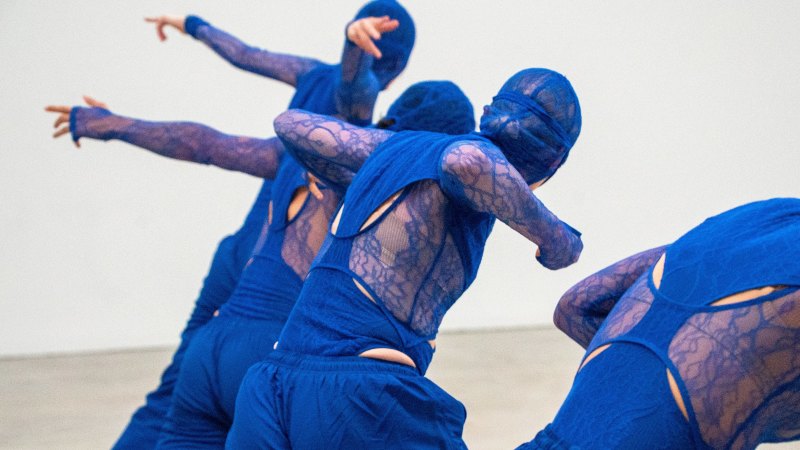Save articles for later
Add articles to your saved list and come back to them any time.
The sight of fifty or so boats of all shapes, sizes and colours cruising in single file down the River Seine might have almost gone unnoticed last week considering the months of dramatic scenes of social unrest in the heart of Paris.
But an escort from the water police unit and boats decked out with TV cameras gave the game up. Along the six-kilometre route from the Austerlitz Bridge to the Pont d’Iena Bridge, near the Eiffel Tower, the river procession gave the smallest of previews of the technical elements in play for a groundbreaking Olympic opening ceremony, a year from now.
A visualisation of a parade of athletes on the River Seine during the opening ceremony of the Paris 2024 Games.Credit: Reuters
In a historic first, the opening night of Paris 2024 won’t be taking place inside the Olympic Stadium. On July 26, 2024, at precisely 8:24 pm, more than a hundred boats packed with 10,000 athletes float along the cleaned-up river for the traditional Parade of Nations.
While around 60,000 spectators normally attend the opening ceremony, at least eight times as many will be present on the banks of the Seine, and more than 80 per cent will be able to attend for free. Eighty giant screens throughout Paris will allow everyone to follow the ceremony live.
The rehearsal is likely to be the only one to be held on the Seine. To keep the magic alive, the other rehearsals – including the artistic elements – will be held on discreet stretches of water.
But the challenges remain numerous, says Thierry Reboul, the brand, creativity and engagement executive director of Paris 2024 – nicknamed “Mr Ceremony” for short.
“It’s a real puzzle, we have to respect the order of protocol and manage the number of delegations,” he told journalists after the trial.
“We are now probably on the 45th version of the opening ceremony. A lot of things are wrong, in terms of timing, manoeuvring … But the basic elements are there. We’re not far off from what we imagined.”
The river will be the icon of the opening ceremony and the location of three events at the foot of the Eiffel Tower: marathon swimming, triathlon and para-triathlon. A race against time has been underway since 2016 to clean up the river and also the Marne, one of the river’s main tributaries.
It’s a return to roots for France since the first time Paris hosted the Olympics, as part of the 1900 Exposition Universelle, when swimming pools didn’t yet exist in the city and swimmers swam in the Seine between Courbevoie and Asnières, two western Paris suburbs.
A visualisation of an aerial show during the opening ceremony of the Paris 2024 Games.Credit: Reuters
Before it was banned in 1923, swimming in the Seine was a popular activity among Parisians. Three bathing sites are now scheduled to open to the public in the summer of 2025 following investment for the event.
The Games will use monuments around the city and suburbs as the backdrop for competitions: fencing and taekwondo at the Grand Palais, beach volleyball at the Eiffel Tower, and equestrian and modern pentathlon at the Château de Versailles. The primary venue of the 1924 Games, the Stade de Colombes, will host hockey, a century on.
While memories of violent riots and Islamic extremist attacks in 2015, killing 147 people – including outside the national stadium – linger, organisers have boldly declared security preparations for the event will turn Paris into “the safest place in the world”.
An empty boat travels the river Seine during the technical test event for the Paris 2024 opening ceremony with the Eiffel Tower in the background.Credit: Getty
Amid several scandals and ongoing domestic issues, French support for the Olympics again slipped last month, with 58 per cent considering the Games a good thing – down 18 points in 18 months, according to an Odoxa poll.
The poll was conducted immediately after police searches were carried out at the headquarters of Paris 2024 and Solideo, the company responsible for Olympic infrastructure, at the request of the National Financial Prosecutor’s Office. An investigation for alleged conflicts of interest, misappropriation of public funds, favouritism and concealment of favouritism is ongoing.
Tony Estanguet, a former Olympic canoeing star with gold medals from the 2000, 2004 and 2012 Games, is the fresh face and chief organiser of the Olympic Games Paris 2024. He is convinced that the event, despite some hurdles, will be a success.
But security remains the number one issue. Nearly 35,000 internal security forces, including police officers and gendarmes, a branch of the French Armed Forces, will be joined by private security agents, in an operation that organisers say has “no precedent in the history of law enforcement”.
Tony Estanguet, the president of the Paris 2024 Organising Committee for the Olympic and Paralympic Games.Credit: Getty
“If you want to be safe, come to Paris for the opening ceremony,” Estanguet says, adding there would be “an anti-terrorist perimeter”.
With just a year to go, he says there is a lot of unfinished work. And he’s fine with that.
“There are lots of things that aren’t ready. But that’s normal,” he said in an interview last week. “I used to be a top-level athlete. It’s never good to be ready a year beforehand … You have to be ready on game day and arrive with the feeling that you’re not quite ready. That way you fight, cling on, give everything to really be at your best.”
Although Paris officials have been concerned about the violence in France over past months – from ongoing strikes, to protests about the pension age and civil unrest triggered by the fatal shooting of a 17-year-old – they say they are not worried about possible knock-on effects to the Games.
“The social and societal impact is quite concerning, but the Games are still a year away. We must not confuse deadlines,” Emmanuel Grégoire, first deputy mayor of Paris, said this week, referencing the “longstanding tradition of Olympic truces”.
“There is a security risk, and we’re managing it … but we have to stop focusing on that. Our country is used to hosting events in the best possible way.”
Get a note direct from our foreign correspondents on what’s making headlines around the world. Sign up for the weekly What in the World newsletter here.
Most Viewed in World
From our partners
Source: Read Full Article






